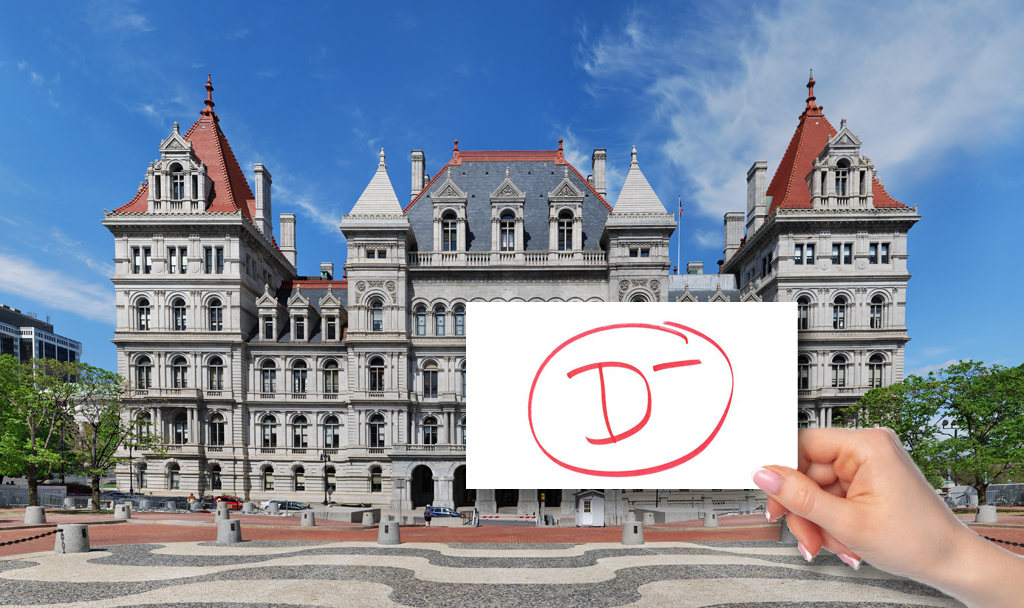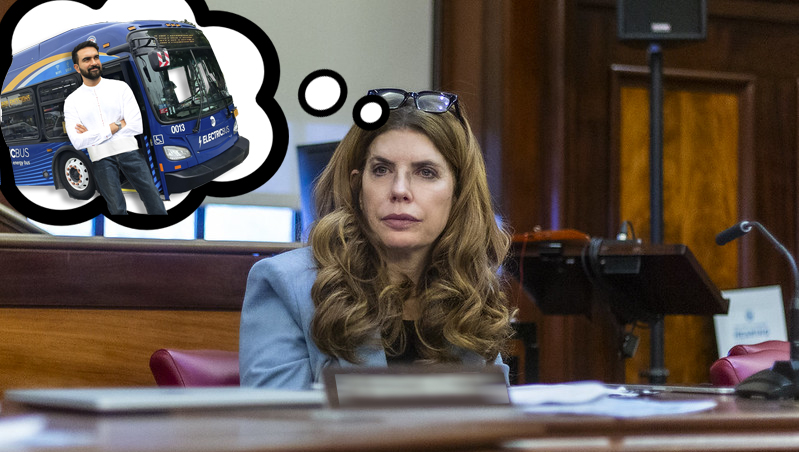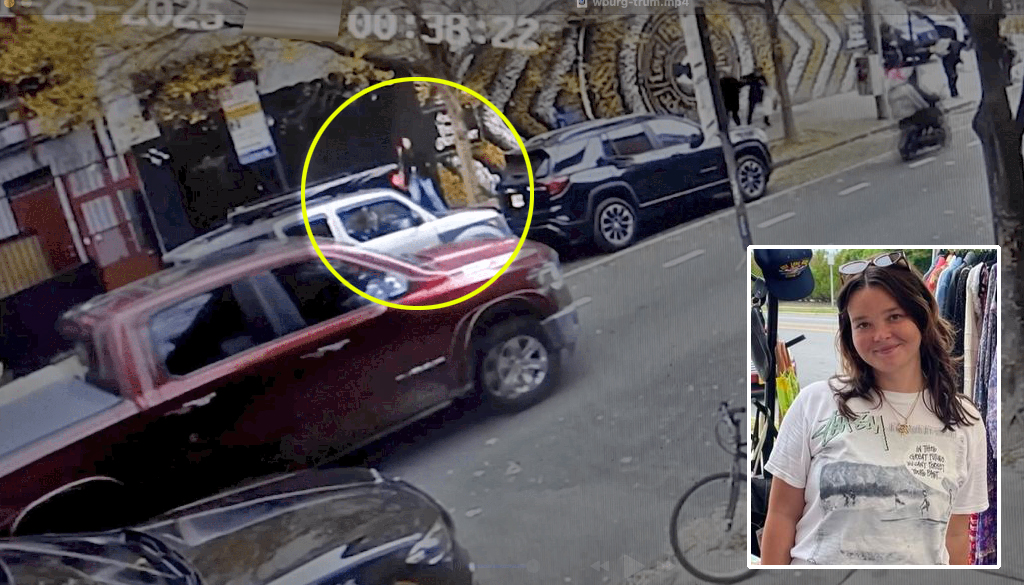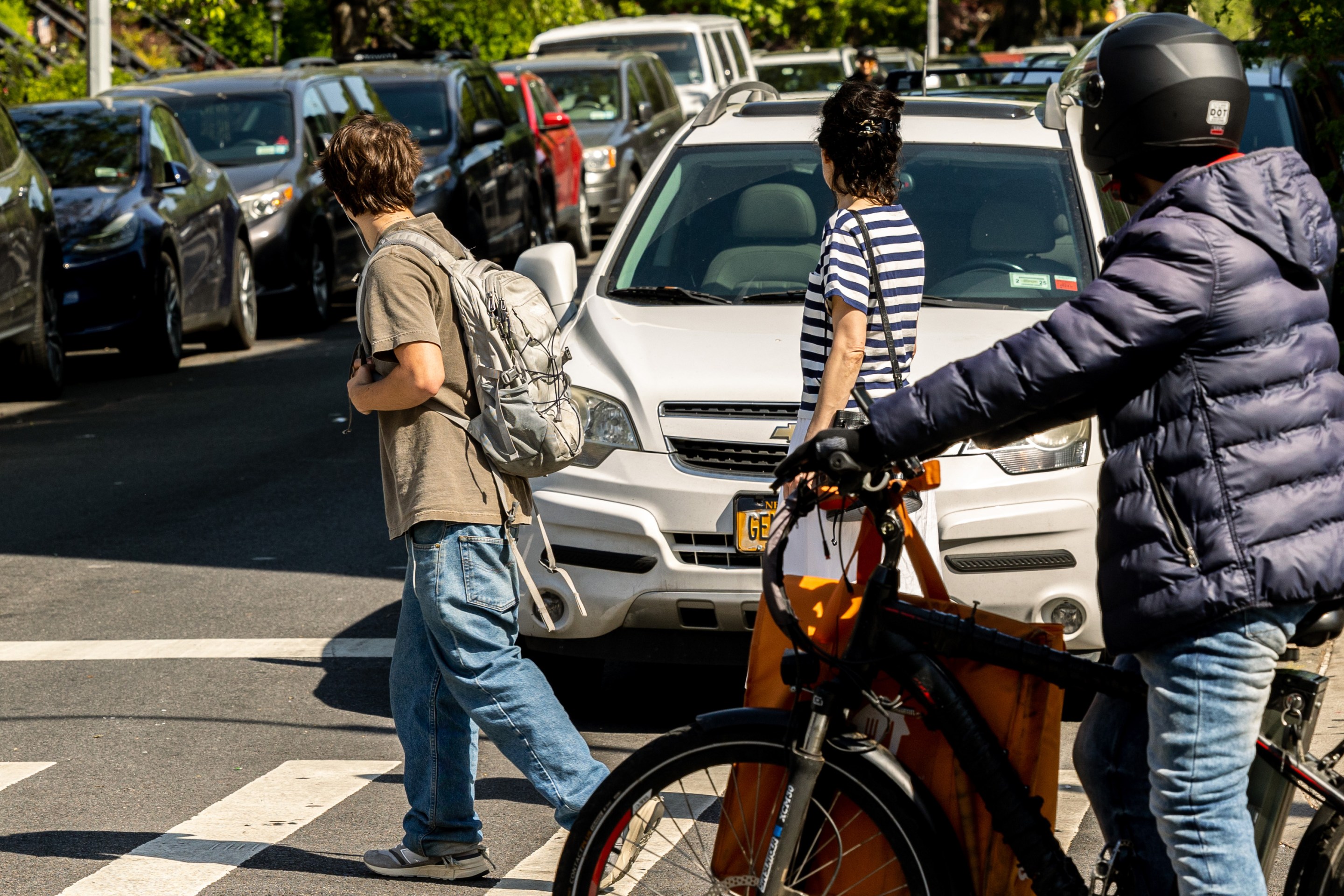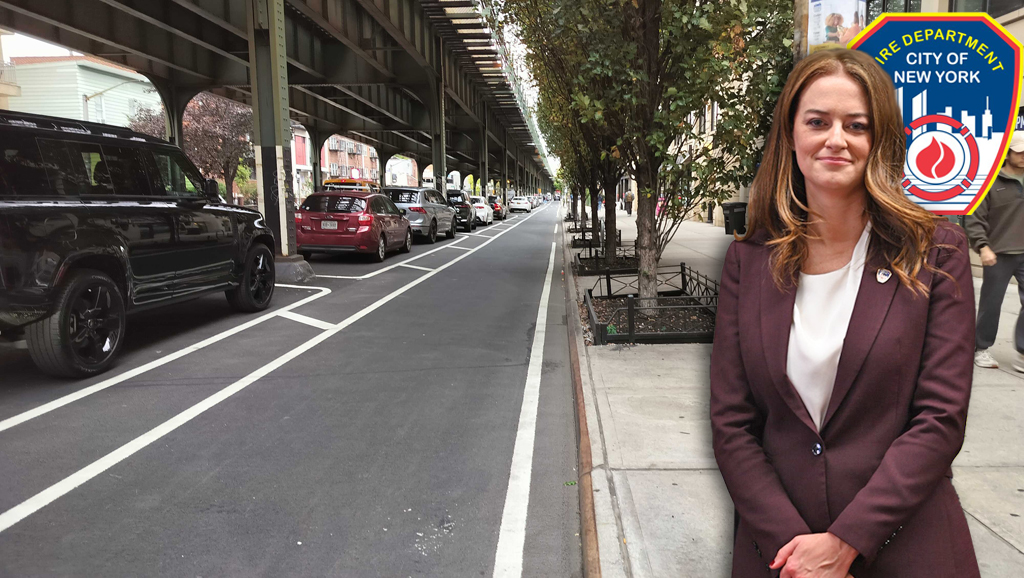
ALBANY — Our elected officials in Albany have failed the livable streets movement again.
This session was always on target for disaster: Albany, already glacial on street safety issues, was all-but-shackled by an especially late budget passage this year, leaving a shorter-than-normal policymaking window. At the same time, many city lawmakers were tentative about street safety in response to Mayor Adams’s and NYPD Commissioner Jessica Tisch’s unprecedented crackdown on cyclists, complete with confusing rhetoric and zero vision for the Vision Zero focus on cars.
So how did this January-to-June session go? Let’s go to the videotape:
The only real success
The lone major victory was the reauthorization of New York City’s highly successful speed camera program until July 1, 2030. Sponsored by Sen. Andrew Gounardes (D-Bay Ridge) and Assembly Member Deborah Glick (D-West Village), the bill now heads to the governor for an expected signature (she is a fan of cameras).
This year’s lack of controversy “marks a huge shift in the politics around automated enforcement. The program is working and saving lives,” said Tom DeVito, the director of Families for Safe Streets.
Gounardes also praised his colleagues for seeing through the ideological arguments that, in the past, forced advocates to rush to Albany every few years to painfully beg lawmakers to reauthorize cameras.
“The true benefit [of speed cameras] is impossible to really measure,” Gounardes said. “Fewer New Yorkers — loved ones, friends and neighbors — needlessly killed in traffic crashes. At the end of the day, this is about keeping New Yorkers safe.”
The near miss
A crucial road safety bill that would have required speed-limiting technology be installed in the cars of recidivist speeders was first watered-down to get through the Senate with a 44-15 vote, but was not passed by the Assembly, dooming it for this session.
Originally, the Gounardes bill, known as Stop Super Speeders (S4045/A9799), would have prevented drivers from going more than 5 miles per hour above the limit if they received six or more red-light or speed-camera infractions in any 12-month period. Such a bill would have covered about 150,000 drivers in New York State, redefining safety forever. But the threshold was raised to 16 tickets — and only speed-camera tickets — which reduced the number of drivers it would likely cover to about 18,000, as Streetsblog reported.
Advocates tried, but failed, to put a positive spin on the bill passing one house.
“One house is good,” said Eric McClure, executive director of StreetsPAC, “but it doesn’t mean anything if it doesn’t pass both.” He said it was “deeply frustrating” that the bill did not get traction in both houses.
But DeVito pointed out that “the bill became bipartisan and has 36 cosponsors in the Assembly.” (Indeed, six Republicans supported the bill in the Senate.)
Both houses were similarly unimpressed by S5775/A975, a bill that would have suspended the registration of any car caught by a city speed camera five times in any 12-month period. It didn’t make it to the floor in either house.
Some minor successes
The $254.3-billion state budget fully funded (sort of) the MTA’s $68.4-billion 2025-29 capital plan, which will boost projects such as the Interborough Express; new subway cars; modernized signals; ADA improvements to subway stations; and zero-emission buses.
The legislature passed a bill ordering up a study on extending the Vanderbilt Motor Parkway greenway, a bill that has passed several times since 2014. The last time it passed, in 2023, it was vetoed by Gov. Hochul as an unfunded mandate, but the governor at least “indicated that she wanted us to work on making the parkway study a reality,” said Sen. John Liu (D-Queens). “It’s a question of funding for the study and execution.”
Only one legislator in both houses voted against it: Nassau Republican Sen. Steven Rhoads, who apparently doesn’t want pedestrians and cyclists coming to his county.
One questionable move to boost casinos could lead to better open space in Flushing: the legislature voted overwhelmingly to “alienate,” or reclassify, 50 acres of parkland as suitable for development, clearing the way for Mets owner and billionaire Steve Cohen’s proposed Citi Field casino.
The deal calls for a bike bridge called Flushing Skypark that boosters say will link the neighborhood to the new community being built next to Citi Field, and critics call a bridge to nowhere. Sen. Jessica Ramos (D-Queens) spoke out against the alienation and voted against it before endorsing Andrew Cuomo for mayor about a week later.
Abject failures
Gov. Hochul had three street safety measures in her Executive Budget, but all were cut.
The first would have banned parking at New York City elementary school intersections (current law prohibits parking or standing 20 feet from an intersection but allows the city to exempt itself — which it does).
The second would have classified heavy cargo bikes as mopeds and forced them to go in the roadway — a bonkers move that would have put those slow-moving Amazon pedal-assist cargo bikes in front of angry car drivers.
The third would have allowed New York City to lower bike lane speed limits.
On that last one, Hochul did score a win anyway. E-bike riders caused just 0.04 percent of pedestrian injuries in the first quarter of 2025, according to the NYPD, but the Adams administration moved to lower e-bike speeds to 15 miles per hour, and demanded same from Citi Bike. And the NYPD has launched a criminal crackdown on cyclists, even as car drivers continue to kill and maim with little consequence.
In other failures, Defined Safe Passing (S1665/A1831) would have required drivers outside of New York City to maintain a three-foot distance when they pass pedestrians and cyclists. A good safety bill that exempts New York City maybe isn’t such a good bill after all? It passed the Senate, but did not make it through the Assembly.
Complete Streets Maintenance (S915/A1077) would have required transportation departments across the state to consider complete streets design features on road projects, but this smart, common-sense, design-based bill passed the Senate, but did not make it through the Assembly.
In a fraught time for e-bike riders, the Senate passed a bill championed by Assembly Member Bobby Carroll (D-Brooklyn) requiring app companies like Uber Eats and Cuomo-supporting DoorDash to provide delivery workers with insurance. It would pay a maximum of $50,000 per person for basic economic loss to affected “delivery drivers,” pedestrians, and cyclists who are not delivery drivers. But it died in the Assembly.
Green Rides, sponsored by Sen. Julia Salazar (D-Brooklyn) and Assembly Member Carroll, would have established a rebate program for e-bikes and e-scooters of 50 percent. It passed the Senate but also died in the Assembly.
The Rider Representation Act (S1148/A1162), from Gounardes and Assembly members Jeffrey Dinowitz (D-Bronx) and Linda Rosenthal (D-Manhattan), would give riders more say in how the MTA operates. The three existing rider representatives on the MTA board would get voting rights and their attendance would count toward a quorum. Gounardes said the bill “gives New Yorkers a real say in the transit system they depend on.” The Senate passed it, but it died in the Assembly.
A bill to equip city Sanitation sweepers with parking-enforcement cameras, introduced last year by Assembly Member Brian Cunningham (D-Brooklyn) passed the Senate, but the Assembly did not take it up. The Sanitation Department has long sought state help to get vehicles out of the way by letting street-sweepers catch illegally parked cars.
“Sometimes we can’t account for whether or not the trucks actually got down the block, or whether or not cars are obstructing them,” Cunningham told Streetsblog. “That destroys our catch basins because they don’t get clean.” He said he got the idea for the bill after a constituent sent him a magazine article in which then-DSNY Commissioner Jessica Tisch proposed cameras.
The Idaho Stop (A7071/S639) as we previously reported, is already the law in 11 states and Washington, D.C. A bill legalizing it failed to pass either house.
A bill from Hoylman-Sigal and Assembly Member Jo Anne Simon (D-Brooklyn) (S445/A3730) would have required universal daylighting in New York City — but did not make it out of committee (in fairness to our upstate pols, there’s the same bill in the City Council).
A bill that would escalate the fines from speed cameras (S2504) so that they wouldn’t be simply a $50 ding never made it out of Senate Transportation.
You’d think something as powerful sounding as the Crash Victim’s Bill of Rights (S884/A967) would have succeeded. But the Hoylman-Sigal bill, which includes common-sense measures like giving “free and timely copies of all crash reports to crash victims and next of kin” and allowing “victim impact statements … at DMV hearings” got stuck in committee.
A bill (S7465/A7511) to replace the word “accident” with “crash” in all traffic laws — a perennial favorite of the livable streets crowd (and Jessie Singer!) — was also stuck in committee, as it has been for years.
Momentum really stalled on the Lower Vehicle Miles Traveled Goal (S4044/A4230), a Gounardes-sponsored bill that established a goal of reducing VMTs by 20 percent over the next 25 years. It generated a lot of buzz when it was introduced last year, and is the law in Minnesota and Colorado, but in New York? It didn’t get out of committee in either house.
On the plus side
It’s not only good bills that die in the Albany abattoir, but some bad ideas disappear, too.
Only one of 17 anti-congestion pricing bills made it to committee this year — and that one, as we reported, only advanced to a committee due to a procedural move pulled by its sponsor, Sen. Jack Martins (R-Nassau). It would have required an “independent forensic audit” of the MTA. Transportation Committee Chair Jeremy Cooney (D-Rochester) used a different move to kill it.
Other bad bills that died:
- A helmet bill (S1542/A590) would have subjected teen e-bike users to fines, even on Citi Bikes, which are legal to ride without a helmet. Opponents say it will make cycling less safe and undermine the Citi Bike system, but it passed the Assembly, which means it could have a chance in the Senate next session.
- Assembly Member Jenifer Rajkumar (D-Queens) had a bill requiring e-bikes and e-scooters in New York City to be registered and have license plates — but it never made it to a committee vote in either house.
- A similar bill (A157) from optician and Assembly Member Sam Pirozzolo (R–Staten Island), would have required helmets to ride all e-bikes, electric skateboards, and electric stand-up or sit-on scooters — and registered all of those devices to be registered with the Department of Motor Vehicles. Like nearly all Republican bills, his died.
Amy’s Albany Addenda
This session, Streetsblog’s first-ever full time Albany reporter spent a lot of time asking people about their relationships to cars, streets, bikes — and policymaking. Here are two of our favorites:
- Assembly Member Phil Steck (D-Colonie): "The famous sociologist Max Weber, who studied bureaucracy, defined the stubbornness of bureaucracy. It is a phenomenon that is not limited to the New York State Assembly, but extends across New York State."
- Assembly Member Emily Gallagher (D-Williamsburg): "Traffic and driving are personal to people. People see the opportunity to drive a car as a fundamental freedom when, if you emotionally detach from it, it actually is not logical to put so much prioritization around it."
